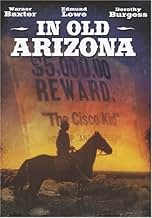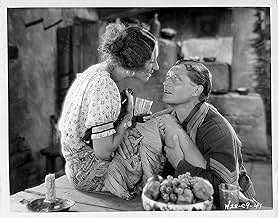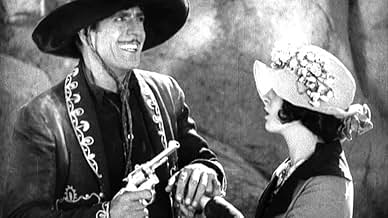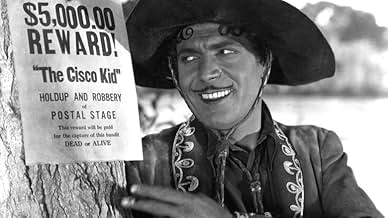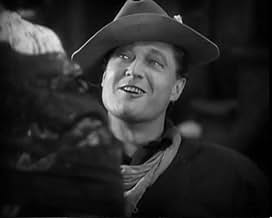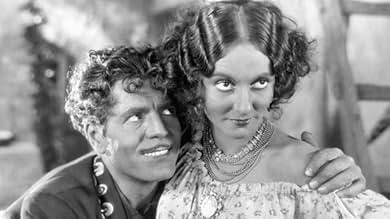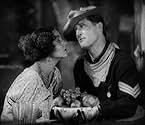CALIFICACIÓN DE IMDb
5.5/10
1.4 k
TU CALIFICACIÓN
Agrega una trama en tu idiomaA charming, happy-go-lucky bandit in old Arizona plays cat-and-mouse with the sheriff trying to catch him while he romances a local beauty.A charming, happy-go-lucky bandit in old Arizona plays cat-and-mouse with the sheriff trying to catch him while he romances a local beauty.A charming, happy-go-lucky bandit in old Arizona plays cat-and-mouse with the sheriff trying to catch him while he romances a local beauty.
- Dirección
- Guionistas
- Elenco
- Ganó 1 premio Óscar
- 4 premios ganados y 4 nominaciones en total
Henry Armetta
- Barber
- (sin créditos)
James Bradbury Jr.
- Soldier
- (sin créditos)
Frank Campeau
- Man Chasing Cisco
- (sin créditos)
John Webb Dillion
- Second Soldier
- (sin créditos)
Alphonse Ethier
- Sheriff
- (sin créditos)
Jim Farley
- Townsman
- (sin créditos)
William Gillis
- Guard
- (sin créditos)
Pat Hartigan
- Cowpuncher
- (sin créditos)
Soledad Jiménez
- Tonita the Cook
- (sin créditos)
Ivan Linow
- Russian Immigrant
- (sin créditos)
Tom London
- Man in Saloon
- (sin créditos)
Helen Lynch
- Stagecoach Passenger
- (sin créditos)
J. Farrell MacDonald
- Stage Passenger
- (sin créditos)
Julius Viggo Madsen
- Tenor in Quartet
- (sin créditos)
Opiniones destacadas
Although this film was released in January 1929, it was filmed in 1928. That makes it truly amazing when you think that the first all-talking picture wasn't even released until July 1928 - "Lights of New York". As others have mentioned, this film does not have lots of action - much screen time is spent with characters just talking in specific locations. There are no exciting shoot-outs or chases as you would expect in a western made just five years later. This is probably due to the motion constraint of the early sound cameras. However, you do get some tremendous long shots of some stunning western vistas. This was because Fox was an early adopter of sound-on-film versus sound-on-disc. This gave Fox the ability to shoot outside and made the studio an innovator in the production of newsreels - they could take their cameras anywhere.
As for the film itself, I'd recommend it only if you're interested in early sound films. Otherwise, you'll probably be bored stiff due to the lack of action. Warner Baxter's portrayal of the Cisco Kid is quite good. He doesn't get too campy with a role that could have been over-the-top in the wrong hands. I do have to wonder - why is every single member of the army that is pursuing Cisco speaking with a Queens accent and why are they using urban New York slang? Was there a mix-up at central casting that day? Was the cast of this film supposed to show up for a Bowery Boys film or a gangster picture and wound up here by mistake? In 1928 there were dialogue coaches, but probably not many coaches on regional dialect. It's a shame to think that if John Wayne had tried out for this early sound western he would have been turned down because he didn't sound like he was from Brooklyn.
As for the film itself, I'd recommend it only if you're interested in early sound films. Otherwise, you'll probably be bored stiff due to the lack of action. Warner Baxter's portrayal of the Cisco Kid is quite good. He doesn't get too campy with a role that could have been over-the-top in the wrong hands. I do have to wonder - why is every single member of the army that is pursuing Cisco speaking with a Queens accent and why are they using urban New York slang? Was there a mix-up at central casting that day? Was the cast of this film supposed to show up for a Bowery Boys film or a gangster picture and wound up here by mistake? In 1928 there were dialogue coaches, but probably not many coaches on regional dialect. It's a shame to think that if John Wayne had tried out for this early sound western he would have been turned down because he didn't sound like he was from Brooklyn.
This is likely the first sound western film as well as the first sound film done out-of-doors. Suggested by "The Caballero's Way", a short story by William Sidney Porter (O.Henry), the main character, "The Cisco Kid", has been considerably upgraded. Porter's "Kid" was a ruthless bandit who didn't like people who got in his way, especially sheriffs. When a sheriff seduced the "Kid's" girl-friend into betraying him into an ambush, the "Kid", ruthlessly clever, took his revenge in a sadistic fashion. In case one might want to read the story, I will say no more. In the film, the "Kid" is a bandit right enough, but a sympathetic one, and sufficiently clever to outwit a sheriff who persuades the girlfriend to disarm the "Kid". She does this by charming him into taking off his gun when he meets her for a tryst. Don't worry, the "Kid" is one up on this trick, too, but protects himself in somewhat gentler fashion than in the story. If one could view this film today it would seem a museum piece, but not without some pictorial charm. I remember the photography as very pictorial, as with some later sequels, and there is a scene of bacon frying over a campfire that rather startled 1929 film goers with the realistic sound.
In Old Arizona made for Fox Films in 1928 has the distinction of being the first all sound film and by dint of that the first all sound western. Warner Baxter won the second Academy Award given out for Best Actor and In Old Arizona bringing to the screen that legendary Robin Hood of the West, The Cisco Kid.
This version of Cisco is a whole lot different than the show I remember as a lad. Duncan Renaldo was a gentlemen, a caballero in the full meaning of the word, ever ready to help anyone in distress. He was a Latino version of Hopalong Cassidy and Cisco and Hoppy had a revival of popularity in the early television days.
But both of those characters were far from what Clarence Mulford and William Sydney Porter wrote. Hoppy was a tobacco chewing rather profane cuss who worked on the Bar 20 ranch, not the kid's role model William Boyd made him. Similarly the Cisco Kid was a charming fellow even for a bandit. But he was a most unapologetic man about his profession.
For this film Baxter's Cisco is cleaned up somewhat, still though he exacts a terrible, but quite just vengeance for betrayal, something Duncan Renaldo never would have done.
Today with political correctness, a man like Warner Baxter never would have been cast as the Cisco Kid, let alone win an Oscar for the role. But Baxter went on to do Cisco in four more films before folks like Cesar Romero, Gilbert Roland and Duncan Renaldo took the character over. There's a reason for this, Warner Baxter did a superb job in the part. Though his accent is obviously fake, he in no way demeans Latinos with his portrayal.
Dorothy Burgess is Cisco's best girl, I say best because she's far from the only one. She's a girl with big ambitions though and a bandit's moll even for a guy as handsome and charming as Warner Baxter has its limits.
Cisco's reeking so much havoc in that country on the American side of the Rio Grande that the army has gotten into the act. With war with Spain imminent, Sergeant Edmund Lowe's been given an order, get Cisco dead or alive.
Lowe essentially brings his Sergeant Quirt persona to the part of New York born sergeant Mickey Dunn. He's about an inch too sure of himself and he too thinks he's best with the ladies.
In Old Arizona also got nominations for Best Picture, Best Director and it goes without saying Best Sound. Though it's ancient now, a lot of people thought the sound of those ham and eggs cooking on the stove for Cisco in Burgess's cabin was considered revolutionary in 1928.
I recommend it highly especially for the ending. As another Latino icon was fond of saying, someone had a lot of explaining to do.
This version of Cisco is a whole lot different than the show I remember as a lad. Duncan Renaldo was a gentlemen, a caballero in the full meaning of the word, ever ready to help anyone in distress. He was a Latino version of Hopalong Cassidy and Cisco and Hoppy had a revival of popularity in the early television days.
But both of those characters were far from what Clarence Mulford and William Sydney Porter wrote. Hoppy was a tobacco chewing rather profane cuss who worked on the Bar 20 ranch, not the kid's role model William Boyd made him. Similarly the Cisco Kid was a charming fellow even for a bandit. But he was a most unapologetic man about his profession.
For this film Baxter's Cisco is cleaned up somewhat, still though he exacts a terrible, but quite just vengeance for betrayal, something Duncan Renaldo never would have done.
Today with political correctness, a man like Warner Baxter never would have been cast as the Cisco Kid, let alone win an Oscar for the role. But Baxter went on to do Cisco in four more films before folks like Cesar Romero, Gilbert Roland and Duncan Renaldo took the character over. There's a reason for this, Warner Baxter did a superb job in the part. Though his accent is obviously fake, he in no way demeans Latinos with his portrayal.
Dorothy Burgess is Cisco's best girl, I say best because she's far from the only one. She's a girl with big ambitions though and a bandit's moll even for a guy as handsome and charming as Warner Baxter has its limits.
Cisco's reeking so much havoc in that country on the American side of the Rio Grande that the army has gotten into the act. With war with Spain imminent, Sergeant Edmund Lowe's been given an order, get Cisco dead or alive.
Lowe essentially brings his Sergeant Quirt persona to the part of New York born sergeant Mickey Dunn. He's about an inch too sure of himself and he too thinks he's best with the ladies.
In Old Arizona also got nominations for Best Picture, Best Director and it goes without saying Best Sound. Though it's ancient now, a lot of people thought the sound of those ham and eggs cooking on the stove for Cisco in Burgess's cabin was considered revolutionary in 1928.
I recommend it highly especially for the ending. As another Latino icon was fond of saying, someone had a lot of explaining to do.
How the heck do you rate this movie?
In its day it might have gotten a 9 or 10; but if this were a contemporary movie, perhaps a 2 or 3, with points for cinematography and a decent plot. Compare it to the Marx Brothers' The Cocoanuts - 1929, which is far more entertaining, though the acting is also rather rough, and the plot ... what plot?
The acting is sometimes quite bizarre, with very wide-eyed expressions and rapid gesticulation. It is overacting that is an obvious remnant from the silent days. The dialogue is mostly rough. The Cisco Kid's is good, but the rest sounds stilted. Oddly, the captain is generally not overacting, and seems to be ad libbing his lines, but they still don't seem realistic, though they are interesting. Are his expressions accurate to the 1890s or the 1920s? Either way, it is an interesting fly in the amber.
I can imagine the studio heads, perhaps watching the audience reaction, saying, hey, maybe we need to hire real actors? But the key players went on to successful careers, so the fault seems to lie with the direction.
Accents? Was there, is there an Arizona accent? For some unknown reason, Sergeant Mickey Dunn talks with a fake New Yawk accent (he is the only one that I noticed). In the O. Henry story, there is no mention of being from NYC. And Edmund Lowe was born in San Jose, Calif., so it was presumably Raoul Walsh's decision. Oh, and Lowe taught English and elocution before becoming an actor, so don't blame Lowe. Perhaps it had something to do with NYC having the special sound on film projectors needed to show the film?
What they did with sound was nothing short of astonishing for the time. The opening scene of ringing the bells shows the sound syncing, and also a lack of speed fluctuation - wow and flutter. There is a lot of ambient sound in the movie, but because of modern noise reduction anything too far off is usually inaudible in the remastered sound track. There are points where an actor leans over into a hidden mic, perhaps accidentally. There are only one or two moments where an actor fades to inaudibility.
All this is astonishing for location shooting long before tape recording. Perhaps the coolest part is filming the sound of the old Edison cylinder phonograph, the best they could do for providing a musical sound track at the time. This was the first film with an optical sound track, and it clearly is the reason it became the dominant system until magnetic sound tracks decades later. Watch The Cocoanuts to hear the problems with sound on disk films -- the sound quality varies a lot through the film.
The film is set somewhere between 1897 and 1901, as there is a line mentioning President McKinley, but the setting seems older. This makes it only about 30 years before the date of the film. Does 1983 sound like the olden days to us? Their sense of the passage of time seems different from ours (see the nostalgic Meet Me in St. Louis, for example), but why? Was it a shorter lifespan, or more rapid, dramatic technological progress? Those 30 years saw the invention of airplanes, automobiles, highways, buses and trucks, radio, moving pictures, and now talking pictures. The 19th century must have seemed long ago.
The best part about In Old Arizona is the cinematography. Not only are the scenics beautiful, but the buildings are full of character, as though it was filmed in Daguerrotypes.
I love old movies, perhaps because they were so hard to find. Growing up outside of New York City, there were several independent TV stations that showed old movies, though in the Sixties, that would have meant movies from the Fifties and Forties -- 10 to 20 years old! The best way to see old movies was to watch the Late Show on WCBS channel 2, which as I recall usually started around 11:30 p.m. When that movie was over, they would show an even older movie on the Late Late Show, perhaps around 2:30 a.m., always introduced by Leroy Anderson's The Syncopated Clock.
If the first two movies were short, there might be an even older movie on the Late Late Late Show, perhaps starting around 3:30 or 4 a.m. That is where I would have seen In Old Arizona, on the time slot for people with acute insomnia, a real challenge for a kid to stay up for. But I probably encountered it as a kid, amazed puzzlement that anything so ancient had ever been put on film, as though my TV had been turned into a time machine. (And for those early risers, next was the Sunrise Semester, Sunrise Sermon, or The Modern Farmer, depending on the day.) Now it is my computer that is the time machine.
There are some very old movies that I like to watch now and then, such as International House or Duck Soup. But I doubt I will ever watch In Old Arizona again, except perhaps in 15 years, 2028, when the movie turns 100. It will probably put me to sleep. It almost did this time.
In its day it might have gotten a 9 or 10; but if this were a contemporary movie, perhaps a 2 or 3, with points for cinematography and a decent plot. Compare it to the Marx Brothers' The Cocoanuts - 1929, which is far more entertaining, though the acting is also rather rough, and the plot ... what plot?
The acting is sometimes quite bizarre, with very wide-eyed expressions and rapid gesticulation. It is overacting that is an obvious remnant from the silent days. The dialogue is mostly rough. The Cisco Kid's is good, but the rest sounds stilted. Oddly, the captain is generally not overacting, and seems to be ad libbing his lines, but they still don't seem realistic, though they are interesting. Are his expressions accurate to the 1890s or the 1920s? Either way, it is an interesting fly in the amber.
I can imagine the studio heads, perhaps watching the audience reaction, saying, hey, maybe we need to hire real actors? But the key players went on to successful careers, so the fault seems to lie with the direction.
Accents? Was there, is there an Arizona accent? For some unknown reason, Sergeant Mickey Dunn talks with a fake New Yawk accent (he is the only one that I noticed). In the O. Henry story, there is no mention of being from NYC. And Edmund Lowe was born in San Jose, Calif., so it was presumably Raoul Walsh's decision. Oh, and Lowe taught English and elocution before becoming an actor, so don't blame Lowe. Perhaps it had something to do with NYC having the special sound on film projectors needed to show the film?
What they did with sound was nothing short of astonishing for the time. The opening scene of ringing the bells shows the sound syncing, and also a lack of speed fluctuation - wow and flutter. There is a lot of ambient sound in the movie, but because of modern noise reduction anything too far off is usually inaudible in the remastered sound track. There are points where an actor leans over into a hidden mic, perhaps accidentally. There are only one or two moments where an actor fades to inaudibility.
All this is astonishing for location shooting long before tape recording. Perhaps the coolest part is filming the sound of the old Edison cylinder phonograph, the best they could do for providing a musical sound track at the time. This was the first film with an optical sound track, and it clearly is the reason it became the dominant system until magnetic sound tracks decades later. Watch The Cocoanuts to hear the problems with sound on disk films -- the sound quality varies a lot through the film.
The film is set somewhere between 1897 and 1901, as there is a line mentioning President McKinley, but the setting seems older. This makes it only about 30 years before the date of the film. Does 1983 sound like the olden days to us? Their sense of the passage of time seems different from ours (see the nostalgic Meet Me in St. Louis, for example), but why? Was it a shorter lifespan, or more rapid, dramatic technological progress? Those 30 years saw the invention of airplanes, automobiles, highways, buses and trucks, radio, moving pictures, and now talking pictures. The 19th century must have seemed long ago.
The best part about In Old Arizona is the cinematography. Not only are the scenics beautiful, but the buildings are full of character, as though it was filmed in Daguerrotypes.
I love old movies, perhaps because they were so hard to find. Growing up outside of New York City, there were several independent TV stations that showed old movies, though in the Sixties, that would have meant movies from the Fifties and Forties -- 10 to 20 years old! The best way to see old movies was to watch the Late Show on WCBS channel 2, which as I recall usually started around 11:30 p.m. When that movie was over, they would show an even older movie on the Late Late Show, perhaps around 2:30 a.m., always introduced by Leroy Anderson's The Syncopated Clock.
If the first two movies were short, there might be an even older movie on the Late Late Late Show, perhaps starting around 3:30 or 4 a.m. That is where I would have seen In Old Arizona, on the time slot for people with acute insomnia, a real challenge for a kid to stay up for. But I probably encountered it as a kid, amazed puzzlement that anything so ancient had ever been put on film, as though my TV had been turned into a time machine. (And for those early risers, next was the Sunrise Semester, Sunrise Sermon, or The Modern Farmer, depending on the day.) Now it is my computer that is the time machine.
There are some very old movies that I like to watch now and then, such as International House or Duck Soup. But I doubt I will ever watch In Old Arizona again, except perhaps in 15 years, 2028, when the movie turns 100. It will probably put me to sleep. It almost did this time.
Despite the desert setting and saloons and the presence of a Mexican bandit, cavalry officers and senoritas, this is really an exotic romantic drama (based on a story by the renowned O. Henry) as opposed to a straight Western. Being an early Talkie, it's obviously creaky with very dated acting but retains plenty of interest for the non-casual film-buff even after all these years: for one thing, it basically served as a template for the myriad Westerns that followed involving the exploits of some famous bandit or other (beginning with King Vidor's BILLY THE KID [1930]); besides, the flirtatious character of Dorothy Burgess may well have inspired Linda Darnell's Chihuahua in John Ford's classic MY DARLING CLEMENTINE (1946) nearly twenty years later!
Warner Baxter was a popular star of the era who has been largely neglected over the years; his Oscar-winning performance here isn't bad, but seems hardly outstanding at this juncture his talent is more readily evident, in fact, in such later films as 42ND STREET (1933) and John Ford's THE PRISONER OF SHARK ISLAND (1936). The same can be said of Edmund Lowe: if he's at all remembered today, it's for his "Quirt & Flagg" series of war films with Victor McLaglen (three of them helmed by this film's original director, Raoul Walsh), the Bela Lugosi vehicle CHANDU THE MAGICIAN (1932; in the title role), and the noir-ish gangster drama DILLINGER (1945). While his character curiously speaks in modern i.e. 1920s slang, he interacts well with both Baxter and Burgess especially effective is the scene where he comes face to face with Baxter's Cisco Kid at a barber shop and, ignorant of the latter's identity, lets him slip away.
The film features a couple of songs (one of them, by the famed songwriting trio of DeSylva-Brown-Henderson, is heard several times throughout and even serves as an Overture to the feature proper) and archaic comedy relief by a number of minor characters notably Burgess' long-suffering elderly maid. There's far more talk than action here, but the twist ending (subsequently much copied) is remarkable if anything, because it's unexpectedly pitiless for a film of its era! Incidentally, the lead role was to have been played by Raoul Walsh himself but he was injured (eventually losing an eye) in a driving accident; Irving Cummings replaced him behind the cameras (and, oddly enough, alone received the Best Director nomination, despite Walsh's name still appearing in the credits)!
P.S. Baxter, Lowe and director Cummings were re-united shortly after for a sequel THE CISCO KID (1930); one wonders whether copies of the film still exist as, ideally, it should have been paired with the original on the bare-bones Fox DVD...
Warner Baxter was a popular star of the era who has been largely neglected over the years; his Oscar-winning performance here isn't bad, but seems hardly outstanding at this juncture his talent is more readily evident, in fact, in such later films as 42ND STREET (1933) and John Ford's THE PRISONER OF SHARK ISLAND (1936). The same can be said of Edmund Lowe: if he's at all remembered today, it's for his "Quirt & Flagg" series of war films with Victor McLaglen (three of them helmed by this film's original director, Raoul Walsh), the Bela Lugosi vehicle CHANDU THE MAGICIAN (1932; in the title role), and the noir-ish gangster drama DILLINGER (1945). While his character curiously speaks in modern i.e. 1920s slang, he interacts well with both Baxter and Burgess especially effective is the scene where he comes face to face with Baxter's Cisco Kid at a barber shop and, ignorant of the latter's identity, lets him slip away.
The film features a couple of songs (one of them, by the famed songwriting trio of DeSylva-Brown-Henderson, is heard several times throughout and even serves as an Overture to the feature proper) and archaic comedy relief by a number of minor characters notably Burgess' long-suffering elderly maid. There's far more talk than action here, but the twist ending (subsequently much copied) is remarkable if anything, because it's unexpectedly pitiless for a film of its era! Incidentally, the lead role was to have been played by Raoul Walsh himself but he was injured (eventually losing an eye) in a driving accident; Irving Cummings replaced him behind the cameras (and, oddly enough, alone received the Best Director nomination, despite Walsh's name still appearing in the credits)!
P.S. Baxter, Lowe and director Cummings were re-united shortly after for a sequel THE CISCO KID (1930); one wonders whether copies of the film still exist as, ideally, it should have been paired with the original on the bare-bones Fox DVD...
¿Sabías que…?
- TriviaThe first all-talking, sound-on-film feature shot outdoors.
- ErroresWhen Cisco robs the stagecoach, he is wearing an army holster (flap-over), the same type the Sergeant wears. But for the rest of the movie, he wears an open holster.
- Citas
[last lines]
The Cisco Kid: Her flirting days are over. And she's ready to settle down.
- ConexionesFeatured in The Soundman (1950)
- Bandas sonorasMy Tonia
Words and Music by Buddy G. DeSylva (as DeSylva), Lew Brown (as Brown) and Ray Henderson (as Henderson)
Sung by Warner Baxter (uncredited)
Selecciones populares
Inicia sesión para calificar y agrega a la lista de videos para obtener recomendaciones personalizadas
- How long is In Old Arizona?Con tecnología de Alexa
Detalles
- Fecha de lanzamiento
- País de origen
- Idiomas
- También se conoce como
- The Cisco Kid
- Locaciones de filmación
- San Fernando Valley, Los Ángeles, California, Estados Unidos(outdoor riding)
- Productora
- Ver más créditos de la compañía en IMDbPro
Taquilla
- Total en EE. UU. y Canadá
- USD 2,834,000
- Tiempo de ejecución1 hora 35 minutos
- Color
Contribuir a esta página
Sugiere una edición o agrega el contenido que falta

